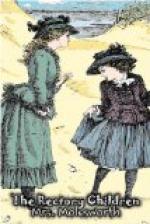‘And what about your sums, child?’ said her father. ’Have you done all I set you?’
’Yes, father, and I’ve read the chapter of Little Arthur’s History too,’ Celestina replied.
‘Well, then,’ said Mr. Fairchild, drawing his chair nearer to the table again—he had pushed it close to the fire—’bring your slate and your books. I’ll correct the sums and set you some more, and then we’ll have a little history. I will question you first on the chapter you have read to yourself.’
Celestina could not help an appealing glance at her mother—she had the two little dolls in her hand, poor Amy still looking very deplorable in her skirt-less condition. Mrs. Fairchild understood her though no word was spoken.
‘I thought you were going back to write in the shop,’ she said gently to her husband. ‘The stove is still hot.’
‘I am too tired,’ he replied, and indeed he looked so. ’There is nothing so very pressing, and it’s too late for the London post. No—I would rather take Celly’s lessons; it will be a change.’
Mrs. Fairchild said no more, nor did Celestina—father’s word was law. The little girl did not even look cross or doleful, though she gave a tiny sigh as she fetched her books. She was a docile pupil, thoughtful and attentive, though not peculiarly quick, and Mr. Fairchild, in spite of his rather nervously irritable temper, was an earnest and intelligent teacher. The sums were fairly correct and the multiplication table was repeated faultlessly. But when it came to the history Celestina was less ready and accurate in her replies.
‘My dear,’ said her mother, who had sat down beside them with her sewing by this time, ’you are not giving your full attention. I can see you are thinking of something else. If it is anything you do not understand ask father to explain it.’
‘Certainly,’ Mr. Fairchild agreed. ’There is nothing worse than giving half attention. What are you thinking about, child?’
Celestina looked up timidly.
‘It wasn’t anything in the lesson—at least not exactly,’ she said. ’But when father asked me who was the king of France then, it made me think of what father said about a French ma’amselle, and I wondered what it meant.’
‘Ma’amselle,’ said her father, ’is only our English way of saying “mademoiselle,” which means a miss, a young lady.’
‘But those young ladies, the Rectory young ladies, aren’t French,’ Celestina said.
’Of course not. What I meant was that very likely they have a French governess. It’s the mode nowadays when every one wants to speak French well.’
‘Oh,’ said Celestina, ’I didn’t understand. I’d like to hear somebody speak French,’ she added. ‘Did you ever hear it, mother?’
‘Yes,’ Mrs. Fairchild replied. ’When I was a girl there was a French lady came to live near us that I was very fond of; and she was very kind to us. She sent me a beautiful present when I married. I called you after her, you know, Celestina—I’m sure I’ve told you that before. Her name was Celestine.’




